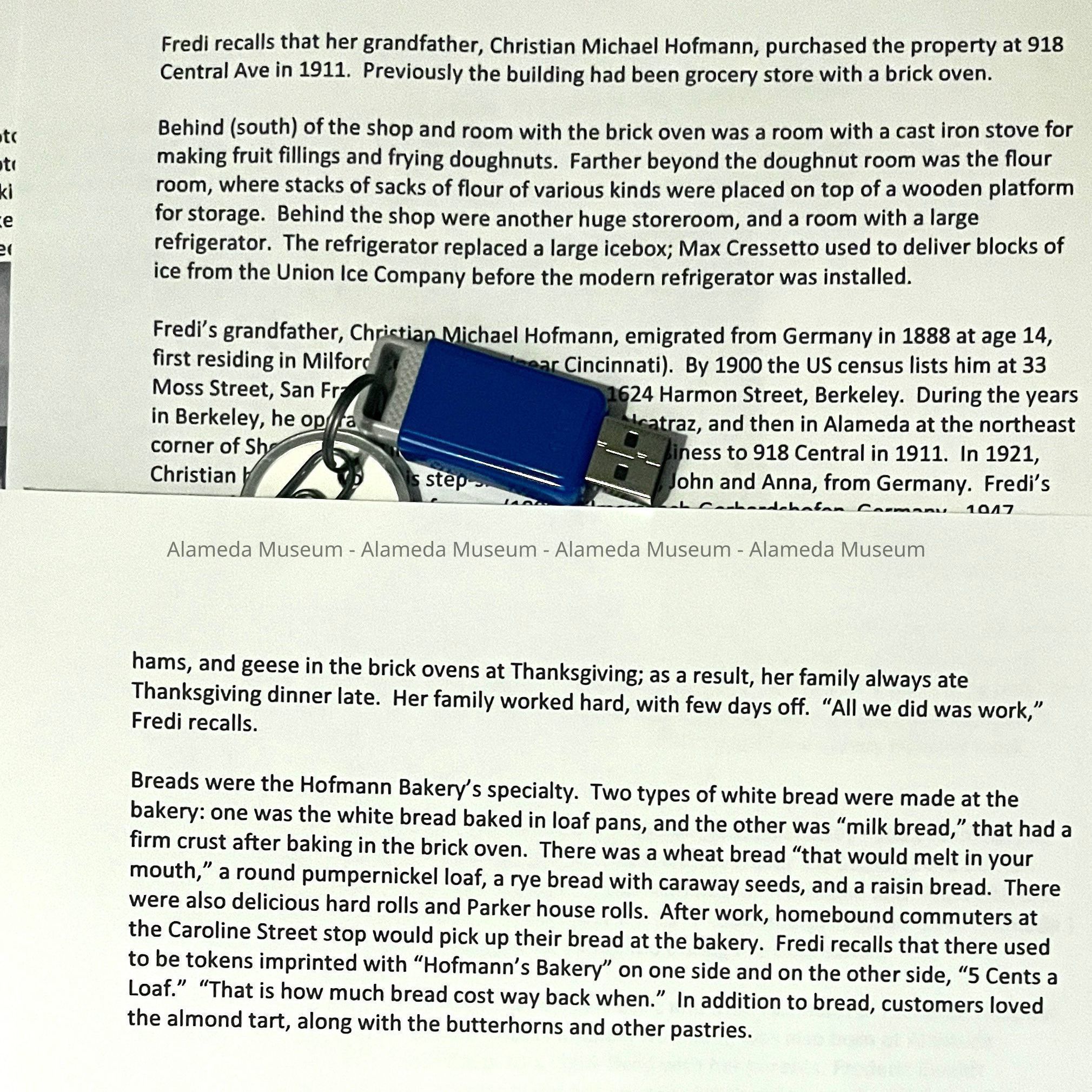Name/Title
Oral History about Hoffman's Bakery, 2021Entry/Object ID
2024.47.1Description
Acc. No. 24.47.1 A, B, C
Subject Category: Businesses of Alameda, Bakeries
Date or Period: 2021
Object: thumb drive (A), printed information (B) clipping (C)
Description: Printed notes and same on a blue-and-grey thumb drive.
Size: printed papers: L 8 1/2 x W 11", drive: L 2 1/2" x W 1"; clipping (folded): L 11 1/2” x W 6 1/2”
History of Object: Clipping and Oral history recorded by Elizabeth Green from conversations with Frederica (Hofmann) Kapp, June & July 2021, with copy of photos by Elizabeth Greene. The information relates to Hofmann's Bakery, located at 918 Central Ave., Alameda, which was run by Frederica's parents. Includes digital photos. Hofmann at one point also owned Boniere Bakery on Park Street.
Donor: Frederica Kapp
Donation Date: 5/6/2022; Catalog Date: 5/22/2024
-------
[Edited] Transcription of printed text:
Fredi recalls that her grandfather, Christian Michael Hofmann, purchased the property at 918 Central Ave in 1911. Previously the building had been grocery store with a brick oven.
Behind (south) of the shop and room with the brick oven was a room with a cast iron stove for making fruit fillings and frying doughnuts. Farther beyond the doughnut room was the flour room, where stacks of sacks of flour of various kinds were placed on top of a wooden platform for storage. Behind the shop were another huge storeroom, and a room with a large refrigerator. The refrigerator replaced a large icebox; Max Cressetto used to deliver blocks of ice from the Union Ice Company before the modern refrigerator was installed.
Fredi’s grandfather, Christian Michael Hofmann, emigrated from Germany in 1888 at age 14, first residing in Milford Center, Ohio (near Cincinnati). By 1900 the US census lists him at 33 Moss Street, San Francisco; in 1910 he lived in Berkeley. During the years in Berkeley, he operated a bakery on Adeline or Alcatraz, and then in Alameda at the northeast corner of Sherman and Lincoln before moving the business to 918 Central in 1911. Fredi’s Uncle John (Michael John Hofmann, and her father, Frederic Hofmann, were partners in the Alameda bakery after Christian retired. The Hofmann Bakery ceased operations in 1974 when Frederic became ill.
Christian’s son George started a wholesale cookie company at the Sherman address before he entered the army during World War I. While in the army, he developed appendicitis and did not survive because penicillin had not been invented yet. He was married a short time and left a young widow. There [was] a historic photo at the Credit Union [which Credit Union?] at South Shore, showing Fredi’s Uncle George Hofmann, standing next to Hofmann’s Bakery with the bakery delivery truck, which replaced a horse and wagon used in the earlier days.
Fredi’s father, Frederic Hofmann, married Irma Fredericks (1911-2011) at the Hofmann family home at 1440 Benton, Alameda, on November 29, 1931. (1440 Benton was built about 1890-91; Fredi’s grandparents, Christian and Anna Martha Louise lived there.) The 1440 Benton Street house was sold for $2,000.00 during the Depression.
Fredi, as a child, lived with her parents, Frederic Ewaldt Hofmann and Irma Fredericks Hofmann and her younger brother Bob on the 2nd floor of the bakery at 918 Central Ave.
During the two weeks’ summer vacation when the bakery shop was closed, the family washed down the shop. The interior walls of the ground floor bakery were clad in tongue and groove siding; Fredi recalls that this was a tough job and your fingers hurt from scrubbing all the grooves. Some time off was spent checking prices at other bakeries, to ensure the Hofmann Bakery was competitive. Fredi recalls that the bakery would roast their neighbors’ turkeys, hams, and geese in the brick ovens at Thanksgiving; as a result, her family always ate Thanksgiving dinner late. Her family worked hard, with few days off. “All we did was work,” Fredi recalls.
Breads were the Hofmann Bakery’s specialty. Two types of white bread were made at the bakery: one was the white bread baked in loaf pans, and the other was “milk bread,” that had a firm crust after baking in the brick oven. There was a wheat bread “that would melt in your mouth,” a round pumpernickel loaf, a rye bread with caraway seeds, and a raisin bread. There were also delicious hard rolls and Parker house rolls. After work, homebound commuters at the Caroline Street stop would pick up their bread at the bakery. Fredi recalls that there used to be tokens imprinted with “Hofmann’s Bakery” on one side and on the other side, “5 Cents a Loaf.” “That is how much bread cost way back when.” In addition to bread, customers loved the almond tart, along with the butterhorns and other pastries.
Photo 3: Irma Hofmann with baby Frederica Hofmann at Hofmann’s Bakery, 1940. From Hofmann family album.
Photo 4: Frederica Hofmann next to a bread dough barrel at Hofmann’s Bakery, c. 1940? From Hofmann family album.
Photo 5: Frederica Hofmann with a pumpernickel loaf at Hofmann’s Bakery, 1940. From Hofmann family album.
